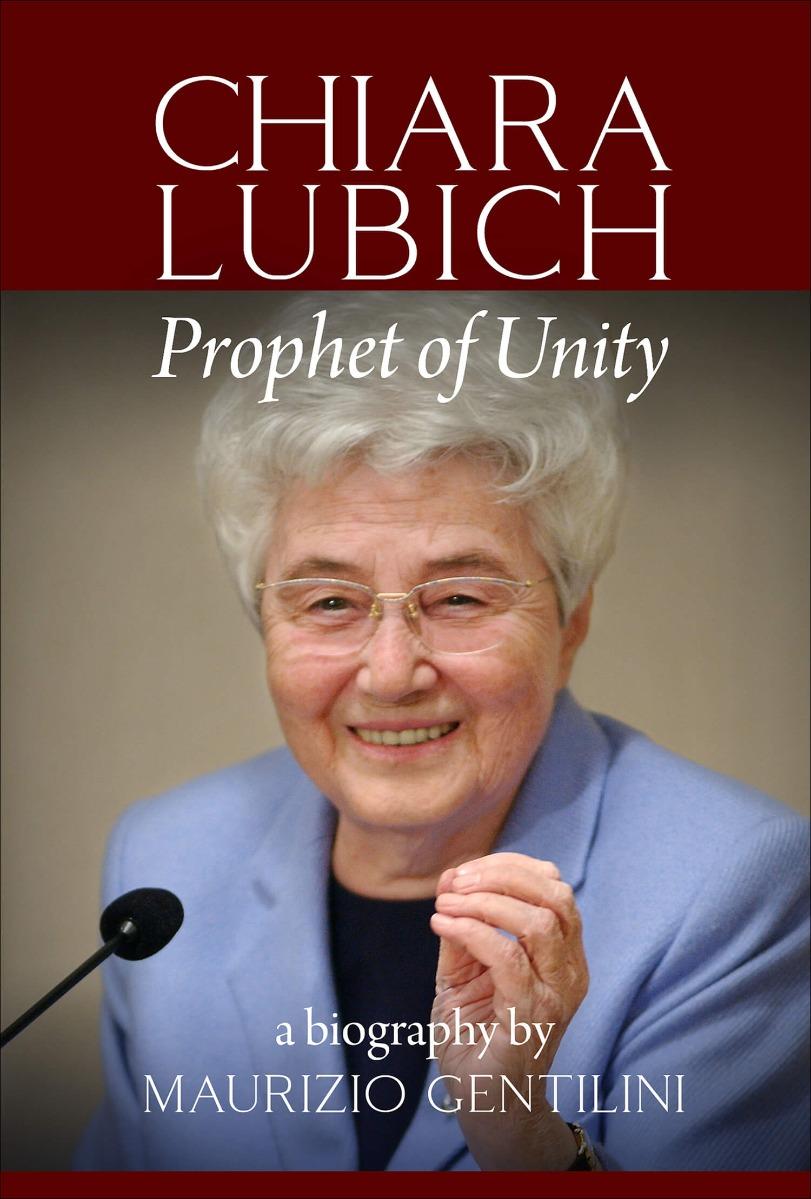
Margaret Karram greeting Focolare founder Chiara Lubich | © Anna Paula Meier – CSC Audiovisivi
We were able to conduct an email interview with Margaret Karram, president of the Focolare Movement, in late November 2023. We thank her for being so kind to find some time in her busy schedule to answer our questions.
We began by asking, how well did you know Chiara Lubich? When did the two of you first meet? And could you tell us a little bit about how your relationship developed?
Margaret Karram – I got to know the Focolare Movement at the young age of fourteen through a religious and some friends. What struck me immediately was that the Gospel could be lived out through the “new” commandment of Jesus, which asks us to love everyone and to do to others what we would like others to do to us. From an early age I had felt a strong attraction to doing something to bring about justice and build peace, but I didn’t know how. Through the spirituality of unity, I experienced that, in order to create societies animated by a Gospel spirit, it is necessary to build bridges and find spaces for dialogue and mutual trust. I discovered that the Gospel not only brings about a spiritual revolution, but a social one as well.
I met Chiara for the first time during a youth conference in Rome. I was sixteen years old and I remember that I was able to greet her personally. I introduced myself and she smiled at me. That gaze of hers remained in my heart like a ray of light.
Afterwards I kept in frequent communication with her and met her on several occasions: once in Turkey, then in Jordan and again in Italy.
From Chiara I learned respect for the dignity of each person and how to live unity in diversity: that is, we may belong to different faiths, cultures and countries, but we can dialogue and embrace the riches that each of us brings.
Is there a story about Chiara that is not well-known that you could share with us? Perhaps it is a story that reveals something essential about her personality?
Yes, there is a fact that I recently came to know in detail that reveals the most intimate “secret” of Chiara’s life, a life that was the foundation for the spreading of the spirituality of unity in the world. Here is the story: On November 9, 1969, crossing on a twenty-four-hour visa, Chiara managed to reach the Movement’s community in East Germany. It was a moment of great emotion: the first focolarinos and focolarinas from Eastern Europe had never met her in person. There were about forty of them in all. To reach them she had had to pass through the Wall that divided the city of Berlin in two. She spoke of Berlin as the “City of the Wound” (referring to the wound of Jesus crucified and forsaken). “A wound that love will cauterize,” she said, “and it will no longer be a wound of pain but of love ... and in the end the Wall will collapse.” When twenty years later, precisely on another November 9, the Wall collapsed, many remembered those words. It might have seemed impossible: borders were all but closed, controls were strict in all countries. But those forty focolarinas and focolarinos believed. Thus began the spreading of the Movement in those eastern European countries.
What does it mean to you to be Chiara’s second successor?
Chiara Lubich was our foundress, the source of the charism of unity, and will always remain our source of inspiration. We experience that unity—which Chiara grasped from Jesus’ testament, “That all may be one” (Jn. 17:21)—is extremely relevant today. It means building relationships based on the principle of mutual love, and spreading among peoples the values of peace and fraternity. It is up to us to keep her dream alive and work to realize it. That is why I would say that Chiara continues to give us courage and that the charism of unity lights the way for many people in the world.
Then, when the founder passes the baton or dies, it is always a trying time for a movement, and for those who succeed a charismatic figure it will never be easy. Maria Voce was the first president of the Movement after Chiara and served with intelligence and great love from 2008 to 2021. She managed to keep the Movement united despite its cultural diversity and the complexity of its configuration. She was a bridge between the first generation of the Movement and those that followed.
As for me, I had no ambition to become president. When in 2021 during the General Assembly I began to realize that the choice was converging on my name, I prayed to God to “remove this cup from me,” but apparently it was God’s will.
Immediately after the election, with all the members of the General Assembly of the Movement, I went to an audience with Pope Francis. I told him that I wanted above all to be a daughter of the Church and that together with the whole Movement I was putting myself at its service.
Several times the Pope showed me his closeness by telling me, “Courage and forward!” This has become for me like a leitmotif that means: always go forward, continue to believe that in every circumstance God manifests his love and shows us the way, even in the most difficult, most absurd situations. I would also like my mandate to be characterized by the testament that Chiara left us: “Always be a family.” If we have this spirit, which means having the warmth, the attention, the gaze that one has between brothers and sisters, we will love whomever we meet.
Do you see differences between the foundational stage of the Focolare Movement, when the founder was alive, and the stage in which the Focolare finds itself now? Could you describe some of these differences or active transitions?
In the foundational stage, that is, when Chiara was alive, the spirituality of unity spoke through her, which is why the Movement developed and spread widely, in about 180 countries. The Catholic Church and different Christian Churches have embraced the charism; many faithful of various religions have embraced the values of mutual love and dialogue; even people without a specific religious position are part of the Movement and contribute to building a society based on human values. Many social works were born in various countries.
Chiara continually nourished the lives of those who joined the Movement with what she lived and understood from God, so we can say that we lived for years the continuous novelty of the charism.
It is a very important time when God is showing us increasingly that we will find the way to bring him to the world together and not alone.
When she left us in 2008, we understood a word she had told us several times, and that was that she was not worried about what would happen when she died, because, God willing, the charism of unity would live on in the hearts and through the lives of all of us. The Holy Spirit would guide us in the steps to be taken.
Today there is no shortage of challenges, precisely because we are no longer in the founding times and, as Pope Francis said a few years ago, this is not an epoch of changes, but we are experiencing a change of epoch that requires us to find new avenues, new words and new ways to proclaim the Gospel.
It is a very important time when God is showing us increasingly that we will find the way to bring him to the world together and not alone.

Focolare President Margaret Karram | © Javier Garcia – CSC Audiovisivi
The Movement has a president and a co-president. How is that different from a president and a vice-president? How does that work?
It was John Paul II who confirmed to Chiara that a woman will always head the Movement; this in order to emphasize its charismatic and lay aspect. The president is the “guarantor” of the unity of the Focolare, which gathers people of many cultures and vocations: from consecrated persons, to families, to young people, to people of various Christian Churches, believers of many religions, but also those who do not identify with a specific religious creed.
This means that her first duty as president is to ensure that the presence of Jesus among those who are united in his name (Mt. 18:20) is never lacking. She leads the Movement forward with the help of the co-president, with whom she reviews major decisions to be surer that they correspond to God’s will.
Thus, the co-president is not a “deputy,” but is the primary collaborator of the president. According to the statutes of the Movement, he must be a focolarino-priest. The co-president ensures that the activities and lives of the members are in accordance with the faith and morals of the Church.
Were you aware of Chiara’s friendship with the past several popes? Did she have a natural rapport with each of them?
Yes, for Chiara the relationship with the pope was always the highest priority because they represented for her the will of God and the presence of his love and will for her and for the Movement. This was the case from the very first years of the Movement: I think of the first contacts with Pope John XXIII and then with Paul VI, which allowed the Movement to take its first steps under the watchful eye of the Church.
Then, Chiara had a special relationship with Pope John Paul II. His pontificate was long and at that time the Movement was developing. He followed its development closely, even attending conventions when he could, such as Genfest, the worldwide event for young people adhering to the spirituality of unity, or the one for families, to name but a few.
This relationship was always a source of great joy for Chiara.
Lastly, do you feel Chiara’s spirit in the Focolare today? Where and when do you feel this most often, or most clearly?
Since I was elected president, I have been trying, as much as I can, to get to know and visit Focolare communities in different countries around the world. I have been to various countries in Asia, some European nations, and Turkey. In July I will go to Latin America for the world meeting of the youth of the Movement in Brazil, and this is why I can answer yes.
Wherever I have gone I have found the spirit of Chiara alive, in action. I see it in every person in our communities with whom I come in contact, a spirit that expresses itself in the most varied ways, with great diversity due to culture, personal character.
And this is the beauty: there is not just one way to bring the spirit of unity, but there are many and I have seen it! This gives me great hope; hope that although there is still so much pain in the world, there are wars, there is economic poverty and so much loneliness, God continues to use us as his instruments, beyond our frailties, our failures. He continues to work in the world through each person who has the seed of love within, giving birth to spaces of fraternity that can change personal lives and the lives of one’s people.
If you enjoyed this article, you might like...














